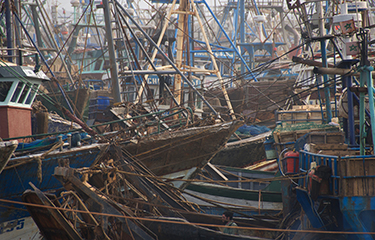IUU economic estimates climb as high as USD 50 billion in new study

Illegal, unreported, and unregulated (IUU) fishing has profound effects on the economies and pocketbooks of developing countries, removing billions of dollars worth of fish every year from the legal trading system.
Between 8 and 14 million metric tons of fish are caught illegally every year, according to a new study from the University of British Columbia (UBC). Those fish are worth an estimated USD 9 billion to USD 17 billion (EUR 8 billion to EUR 15 billion).
But the overall economic loss resulting from those illegal catches is even greater: USD 26 billion to USD 50 billion (EUR 23 billion to EUR 44 billion) globally, when the full economic effects are multiplied. Additionally, the losses in tax revenue are between USD 2 billion and USD 4 billion (EUR 1.8 billion to EUR 3.5 billion), the study estimated.
The study used reconstructed catch data from 2004 to 2015 from the Sea Around Us project to calculate catch losses from 143 countries. The study demonstrates the financial reverberations of illegal fishing.
Rashid Sumaila, a UBS profess and the study's lead author, told SeafoodSource there was one main question driving the study.
"What happens to the value chain in terms of potential added value, in terms of wages and taxes and losses of trade?" Sumaila said.
Sumaila and his fellow researchers searched for the answer. They calculated the broad financial impacts of illegal fishing by using economic multipliers for individual countries. Globally, a fish that is worth USD 1.00 (EUR 0.94) on the dock will add three times that value of total economic impact on average, they discovered.
Asia, Africa, and South America together accounted for 85 percent of global catch losses to illegal seafood trade, with the effects most pronounced in Africa and Asia. In Africa, the study estimated economic impacts to total USD 8 billion to USD 14 billion (EUR 7 billion to EUR 12 billion). Much of this can be linked to unreported catches by large, foreign industrial fleets, the study said. The economic impacts in Asia are even greater, with losses between USD 10 billion and USD 20 billion (EUR 9 billion and EUR 18 billion).
Both continents also lose significant tax revenue. Africa and Asia each suffer around USD 800 million to USD 1.5 billion (EUR 708 million to EUR 1.3 billion) and USD 1.6 billion (EUR 1.4 billion), respectively.
Often, the catches are processed onboard large foreign transshipment vessels and sent directly overseas. Developing countries are deprived of valuable food sources, along with jobs and revenue from unloading and processing.
"A lot of the fishing don't touch their coasts. They get processed on the water and shipped and sent home. So, these jobs don't appear in the country where the fish is fished," Sumaila said.
Sumaila warned that the impacts of forced migration that can result when peoples’ livelihoods disappear frequently end up on the shoulders of those in developed countries.
To be sure, not all unreported catches are illegal, especially in small-scale artisanal fisheries where there is no legal mandate to record catches. In some cases, there is a requirement, but no data collection system to actually record and report all the catches.
The study’s source data from the Sea Around Us initiative, which provides comprehensive estimates of unreported catches from 1950 to 2014, using secondary data, peer-reviewed studies, local expert knowledge, and other sources. Two decades ago, researchers at Sea Around Us, including Sumaila, started assembling the catch reconstructions because they felt that the official numbers published by the United Nations’ Food and Agriculture Organization were lacking.
"We quickly realized that the official FAO data misses quite a bit," Sumaila said. "You don't understand what is happening in the small-scale fisheries sector, the recreational fisheries sector, you don't know what is discarded. The total cannot be understood from the FAO numbers."
The Sea Around Us split catches into reported and unreported categories. The reported catches going through official channels are most likely legal.
"The unreported is where most of the IUU fishing is and where most of the illicit trading is," Sumaila said.
Fish catches that go unreported are not accounted for in scientific evaluations of fish stocks, potentially causing fishery managers to overestimate the health of the population and leading to overfishing. And overfishing can cause loss of revenue and employment.
"We don't have information to properly manage the resource. So that leads to further losses in the future because you're losing potential because of mismanagement," Sumaila said.
Of course, illegal fishing benefits the companies selling the fish itself. The study noted that, like other illegal activities, illicit trade in fish and seafood products makes a small number of operators and businesses rich at the expense of society as a whole.
"We are talking about losses today to the formal economy and the formal sector," Sumaila said. "Somebody is going to benefit, but it's lost to the formal economy sector."
The researchers urged governments to ratify and enforce international agreements on transshipping, while granting fishing access only to vessels insured by marine insurance companies. Countries also need to collaborate on enforcement activities.
"We need to have better reporting so we know what is coming out of the ocean," Sumaila said. "We need more efforts to really document what is going on on the water. And countries need to report the information. Sometimes they have the information, but they just won't report it."
Photo courtesy of PeskyMonkey/Shutterstock






Share